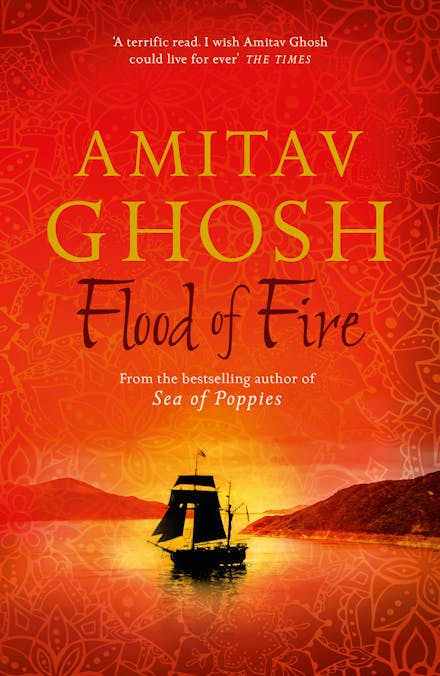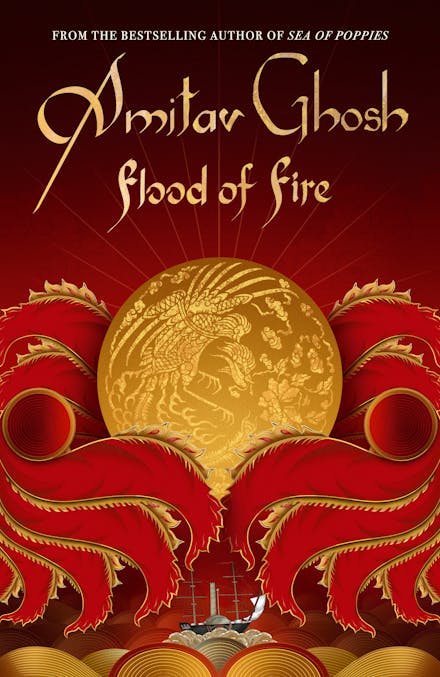Imprint
- John Murray
- John Murray
- John Murray
South East Asia, c 1800 to c 1900, Fiction, Modern & contemporary fiction (post c 1945)
-

Imprint
John Murray
- Paperback Aug 9, 2016 | 9780719569029 | RRP $24.99 Buy Now
- Audiobook May 28, 2015 | 9781473614116 | RRP $35.99 Buy Now
- e-Book May 28, 2015 | 9781848545182 | RRP $11.99 Buy Now
Play Sample0:00 -

Imprint
John Murray
- Paperback Aug 9, 2016 | 9780719569029 | RRP $24.99 Buy Now
- Audiobook May 28, 2015 | 9781473614116 | RRP $35.99 Buy Now
- e-Book May 28, 2015 | 9781848545182 | RRP $11.99 Buy Now
Play Sample0:00 -

Imprint
John Murray
- Paperback Aug 9, 2016 | 9780719569029 | RRP $24.99 Buy Now
- Audiobook May 28, 2015 | 9781473614116 | RRP $35.99 Buy Now
- e-Book May 28, 2015 | 9781848545182 | RRP $11.99 Buy Now
Play Sample0:00
The final book in the bestselling Ibis trilogy from the author of Booker-shortlisted SEA OF POPPIES.
The thrilling climax to the IBIS trilogy that began with the phenomenal Booker-shortlisted SEA OF POPPIES.
It is 1839 and tension has been rapidly mounting between China and British India following the crackdown on opium smuggling by Beijing. With no resolution in sight, the colonial government declares war.
One of the vessels requisitioned for the attack, the Hind, travels eastwards from Bengal to China, sailing into the midst of the First Opium War. The turbulent voyage brings together a diverse group of travellers, each with their own agenda to pursue. Among them is Kesri Singh, a sepoy in the East India Company who leads a company of Indian sepoys; Zachary Reid, an impoverished young sailor searching for his lost love, and Shireen Modi, a determined widow en route to China to reclaim her opium-trader husband's wealth and reputation. FLOOD OF FIRE follows a varied cast of characters from India to China, through the outbreak of the First Opium War and China's devastating defeat, to Britain's seizure of Hong Kong.
FLOOD OF FIRE is a thrillingly realised and richly populated novel, imbued with a wealth of historical detail, suffused with the magic of place and plotted with verve. It is a beautiful novel in its own right, and a compelling conclusion to an epic and sweeping story - it is nothing short of a masterpiece.
Praise for Flood of Fire: Ibis Trilogy Book 3
-
A masterpiece . . . Flood of Fire is not just a work of literary imagination but also an exercise in deep and original historical reflection - Chris Clark, author of Sleepwalkers
-
For the past weeks, [Amitav Ghosh] has been holed up in his Goa home, putting the finishing touches to Flood of Fire, the third part of his epic Ibis trilogy. The project has taken a decade. The three novels, starting with Sea of Poppies . . . have cemented his reputation - Financial Times
-
Totally absorbing - Literary Review
-
As ever for Mr Ghosh, language is a great tumasher, and it is not surprising that he is on the shortlist for the biennial Man Booker International Prize . . . He swims with relish in a lexicon he has made his own, a rich brew of English, Bangla, Hindi, Parsi, Malay, Cantonese and pidgin at a time when free trade and imperialism were recombining Asian cultures and tongues . . . Mr Ghosh's genius is to paint this world from its teeming heart, rather than from the perspective of metropolitan centres of power in London, or, for that matter, Peking - The Economist
-
It is a testimony to Ghosh's great skills that he can both teach us history and create believable fictional characters . . . What makes Ghosh's characters come alive all the more is the use of language . . . Ghosh, occasionally, translates, but often does not, yet pulls off this presentation of the medley of tongues his characters use with great aplomb - Independent
-
Amply justifying the hype and expectation, this is a thrillingly realised and richly populated novel, imbued with a wealth of historical detail, suffused with the magic of place and plotted with great verve: Flood of Fire is a beautiful novel in its own right, and a compelling conclusion to an epic and sweeping story, one of the greatest literary works of our time. For Amitav Ghosh, the glittering literary prizes beckon - Nudge Book
-
Ghosh's scrupulous depiction of army life is just one part of this tour de force of historical description. Together, the novels are a weighty and precious chronicle of those times, a compendium of lost habits, languages and attitudes . . . Flood of Fire has all the romance, subterfuge and ingenious plotting to keep Ghosh's audience firmly lagowed. But it is the integrity of his historical vision that will ensure his books outlast other literary dumbpokes - FT Weekend
-
The best bits of the trilogy, however, do not merely satirize the greed and hypocrisy of the foreign traders; but allow crosscurrents of sympathy . . . full of unforgettable vignettes - The Spectator
Reader reviews (1)
-
Flood of Fire is the third and final book in the Ibis Trilogy by Amitav Ghosh. Where readers of River of Smoke may have wondered what happened to the major players in Sea of Poppies, those questions are answered by Flood of Fire. Characters from both previous books reappear, along with new characters. Neel continues his account of events, much of it in the form of a journal. Zachary Reid has a narrative role, as do Kesri Singh, older brother of Deeti, and Shireen Moddie, widow of Bahram. Well into the tale, the voice of a young boy, Raju, is added. While a newly exonerated but penniless Zachary tries to put his life back together, Neel uses his linguistic talents to help the Chinese war effort. Kesri heads a team of sepoys who form part of the fighting force on the English side, and Shireen heads to Canton in an attempt to gain compensation for Bahram’s lost opium cargo. Once again, the Ibis seems to draw the characters to her. As the Ibis, Anahita and Hind converge on the Pearl River Delta, many of the characters from Sea of Poppies and River of Smoke find themselves in close quarters. Against a background of the battles of the First Opium War, Ghosh demonstrates the depth of research done (which he attributes to his ancestor) in the detail he provides on a multitude of topics: the composition of fighting forces involved in the wars, what comprised their uniforms, the important role of the army followers, the restrictions on travel into Canton, the power of translators, Victorian sex therapy, futures trading in the nineteenth century, and, of course, the Opium Wars. He includes a wealth of information in easily digestible form by weaving the facts into an absorbing tale full of interesting characters. Ghosh also gives the reader plenty of humour: he subjects poor Zachary to all kinds of indignities and gives the reader plenty of laughs at his expense. Who knew there were so many euphemisms for sexual terms in Victorian times? Double entendre and innuendo abound. Reunions, too, are plentiful, some less friendly than others. There are dramatic battles, more than a few deaths, a marriage proposal, quite a bit of impersonation, some secret assignations, and an act of piracy. Characters develop, but not all for the better. In his Epilogue, Ghosh explains that the story could continue, but having spent ten years on the trilogy thus far, and unwilling to abbreviate the tale as would not do it justice, he leaves it with, what no doubt many readers will feel, much unsaid. The final moments of the main story hold a delightful twist that will have many readers laughing out loud. At over six hundred pages, this may be a brick, but it is a brilliant read. With thanks to The Reading Room and Hachette for this copy to read and review.
Marianne Vincent
Rated 5

Amitav Ghosh
Amitav Ghosh is the author of the bestselling Ibis trilogy, comprised of Sea of Poppies (short-listed for the 2008 Man Booker Prize), River of Smoke, and Flood of Fire. His other novels include The Circle of Reason, which won the Prix MA dicis A tranger, and The Glass Palace. He is the author of many works of nonfiction, including The Great Derangement: Climate Change and the Unthinkable and The Nutmeg's Curse: Parables for a Planet in Crisis. He holds two lifetime achievement awards and four honorary doctorates. In 2015, he was named as a finalist of the Man Booker International Prize. In 2018, Ghosh became the first English-language writer to receive the Jnanpith Award, India's highest literary honor, and in 2024 he was awarded the Laureate Erasmus Prize. He lives in Brooklyn, New York.
























.png?auto=compress&w=150&h=60&fit=crop&fm=jpg)


.png?auto=compress&w=150&h=60&fit=crop&fm=jpg)


